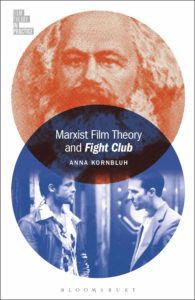 Marxist Film Theory and Fight Club (Bloomsbury, 2019)
Marxist Film Theory and Fight Club (Bloomsbury, 2019)
Anna Kornbluh provides an overview of Marxist approaches to film, with particular attention to three central concepts in Marxist theory in general that have special bearing on film: “the mode of production,” “ideology,” and “mediation.” In explaining how these concepts operate and how they have been used and misused in film studies, the volume employs a case study to exemplify the practice of Marxist film theory.
Fight Club is an exceptionally useful text with which to explore these three concepts because it so vividly and pedagogically engages with economic relations, ideological distortion, and opportunities for transformation. At the same time, it is a very typical film in terms of the conditions of its production, its marketing, and its popularity. Adapted from a novel by Chuck Palahniuk, the film is a contemporary classic that has lent itself to significant re-interpretation with every shift in the political economic landscape since its debut.
Marxist Film Theory and Fight Club models a detailed cinematic interpretation that students can practice with other films, and furnishes a set of ideas about cinema and society that can be carried into other kinds of study, giving students tools for analyzing culture broadly defined.
Reading Marxist Film Theory and Fight Club
Kornbluh has devised a remarkable two-fisted engine that examines simultaneously and in turns Marxist film theory and Fight Club. She offers a rigorous and highly original analysis of the film, in which cinematic form and economic circumstances vie with and outstrip each other, and a superb demonstration of the dialectic at work.
Joan Copjec, Professor of Modern Culture and Media, Brown University
“The first rule of Fight Club is: You do not talk about Fight Club.” So, what’s the first rule of Marxist film theory? If you or Anna Kornbluh can’t talk about that either, her short sharp introduction nonetheless offers an expert account of what Marxism is and why-maybe more than ever-it matters. Moving elegantly between different theories of film and a film that does the work of theory, she both explains how several modes of Marxist analysis work and makes a powerful case for Marxism’s status not as one method among many but rather as our best and maybe last chance to engage and to engage critically with the forms of a world we must find wanting.
Kent Puckett, Professor of English, University of California, Berkeley
Reviews
Imogen West-Knights, Times Literary Supplement
Damian Winczewski, Marx & Philosophy
Ali Alizadeh, Sydney Review of Books